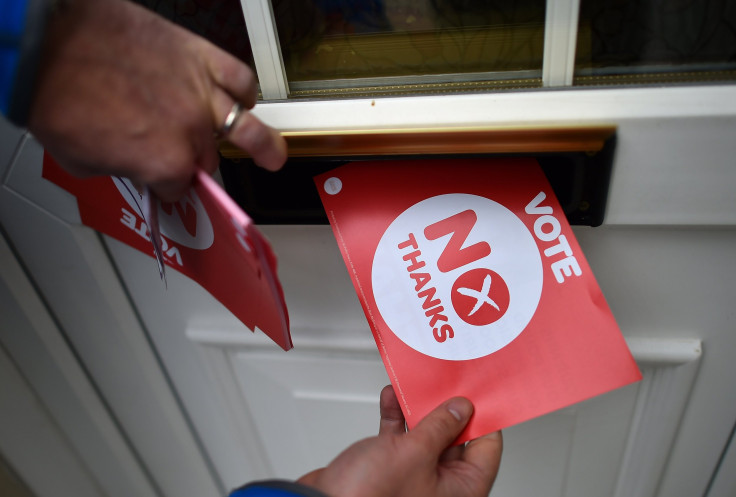Scotland Referendum 2014: Global Markets Relatively Calm, Expect A No Vote

Hours away from Scotland’s referendum vote on splitting from the U.K., the latest polls suggest that the No contingent could prevail. Bookmakers also say a No majority vote is the odds-on favorite. And markets, which had been spooked in recent weeks by the prospect of Scottish independence and the economic chaos that would ensue, seem to agree.
Though London’s FTSE 100 slipped 0.2 percent, or 11.34 points, on Wednesday, every other major European stock market was up: Germany’s DAX was up 0.3 percent, and France’s CAC, 0.5 percent. In Asia, the Nikkei ended down 0.1 percent, but this was mainly due to investor uncertainty ahead of the U.S. Federal Reserve’s decision on interest rates.
“The markets expect a No,” Capital Economics’ economist Julian Jessop told International Business Times. “You would have seen a lot more volatility now if it had expected a Yes.”
“What we’re dealing with here is pure uncertainty,” Jessop said. “There’s an enormous list of unanswered questions."
Markets would be slightly buoyed by a No vote but would crater in the wake of a Yes vote, say experts. “If it’s a No vote, expect the FTSE to go up by around 50 points, but if it’s a Yes vote, expect the FTSE to fall 200 points,” Richard Griffiths, associate director at Berkeley Futures, said to Reuters.
Independence supporters have generally said they'd like to maintain the use of the British pound, which would be a relatively stabilizing factor. However, the pound has already fallen in anticipation of the vote, and it would likely fall even further if Scotland becomes independent.
“We think many stocks listed in the U.K. or with significant economic exposure to the U.K. have pulled back on fears that a Yes vote on Scottish independence could lead to a sharp depreciation of the British pound and a potentially destabilizing crisis in the whole British banking system,” Brian Hennessey, portfolio manager at Alpine Funds, told IBTimes.
It’s likely that, at least in the interim, investors would be less confident in the U.K. and move their money toward a relatively more stable market.
“If the independence vote passes, there will be a movement of funds out of the U.K. to the USA,” Barry Bosworth, former presidential advisor and now senior economist at the Brookings Institution, said to IBTimes, adding that this would raise the exchange rate of British pounds to dollars even further.
While some analysts have expressed concerns that an independent Scotland could empower other similar movements in other countries such as Spain, China or even Canada, economists say these political leanings won’t affect markets any time soon.
“A Yes vote would stimulate similar movements in other regions,” Bosworth said. “It would increase investor uncertainty, but no huge effect.”
© Copyright IBTimes 2024. All rights reserved.





















